Zenith Bank H1 2024 Result: Pre-Tax Profit Climbs to N727bn on Higher Off-Balance Sheet Financial Transactions
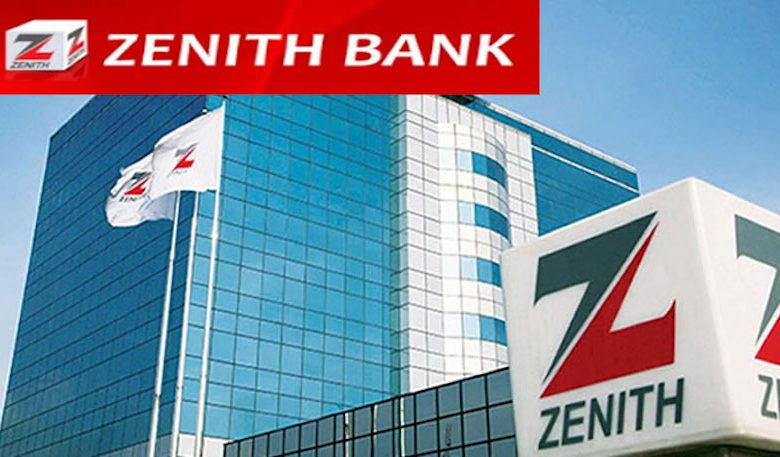
Zenith Bank’s increased off-balance-sheet transactions complemented its income from its core lending operations to generate a positive H1 2024 result. Gross and net earnings rose to a record high, generating 98.2% earnings per share (EPS). Unlike other banks, whose non-interest income was dominated by FX revaluation gains, Zenith Bank generated much of its non-interest income from derivatives, exempting it from FX windfall taxes and FX counterparty risks.
Zenith Bank’s presence across Africa increased its exposure to continental macroeconomic headwinds, resulting in a continental loss of N21.53bn in H1 2024 due to hyperinflation in Ghana. Analysts observed that Ghana’s macroeconomic environment has slightly improved, with inflation moderating to 20.40% in August 2024. This indicates reduced forward monetary loss, with higher profitability in Q3 and Q4 2024.
Prompted by a recapitalisation directive by the Central Bank of Nigeria (CBN) to all banks, Zenith Bank embarked on a public offer and rights issue to raise N290bn between August 1, 2024, and September 2024. The amount raised is yet to be announced, but the offer amount would close the group’s capital gap to meet the N500bn minimum requirement to retain its international banking license. Analysts suspect the group could leverage its presence in Africa to attract foreign investors to the offer. Beyond the capital raise, the bank has been silent on geographical expansion but instead focused on investment in technological infrastructure, with a current software migration to Oracle’s Flexcube from Phoenix. The migration has created glitches and customers’ inaccessibility to banking services, which is part of the inherent risk in platform migration. This could affect the bank’s share price in the interim, but analysts expect the pessimism to wear off soon.
Table 1:
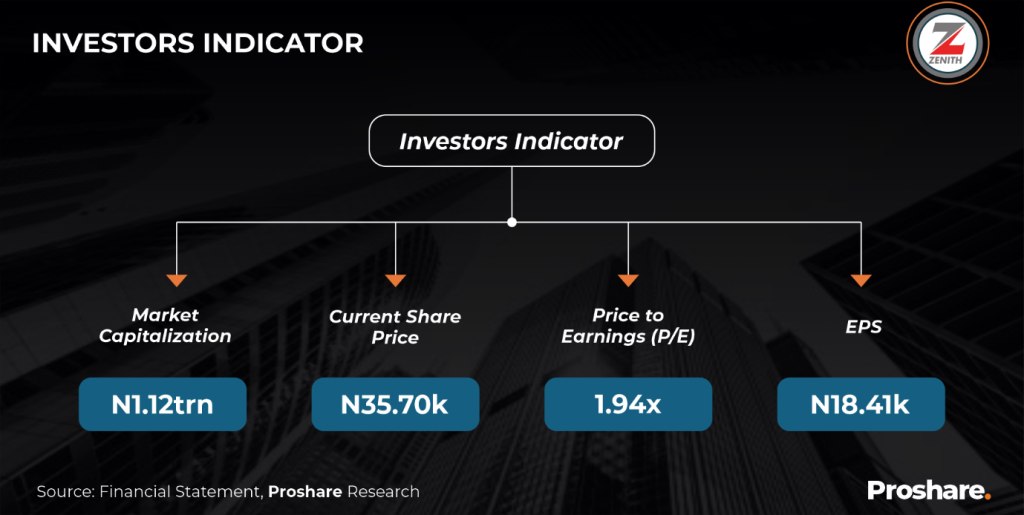
Key Highlights H1 2024
- Zenith Bank’s gross earnings rose by +117.25% from N967.26bn in H1 2023 to N2.10trn in H1 2024.
- Increased loan and advances drove a +176.45% growth in interest income to N1.15trn and a +714.39% growth in non-interest income in H1 2024.
- The group’s operating cost rose by +63.46% from N148.00bn in H1 2023 to N333.23bn in H1 2024.
- Despite the higher operating expenses, the group’s Profit before tax rose by +107.51% from N350.36bn in H1 2023 to N727.03bn in H1 2024, and profit after tax grew by +98.04% to N578.00bn in H1 2024 from N291.86bn in H1 2023.
- Total assets rose by +72.01% to N27.58trn in H1 2024 from N16.03trn in H1 2023
- Loans and advances rose by +83.97% to N9.29trn in H1 2024 from N5.05trn in H1 2023.
- Customer deposits increased +68.87% to N19.63trn in H1 2024 from N11.63trn in H1 2023.
- Shareholder’s funds rose by +79.24% to N3.19trn in H1 2024 from N1.78trn in H1 2023.
- Earnings per share increased to N18.41k in H1 2024 from N9.29k in H1 2023.
- Zenith’s Net Impairment Charge rose +99.73% to N415.29bn in H1 2024 from N207.93bn in H1 2023.
- Retained earnings rose +107.05% from N784.38bn in H1 2023 to N1.62trn in H1 2024.
- Other operating income declined -101.59% from N368.75bn in H1 2023 to -N5.86bn in H1 2024.
Gross Earnings
The group’s gross earnings rose by 117.25%, rising to N2.10 trillion in H1 2024 from N967.26 billion in H1 2023. This growth was driven by a 176.45% increase in interest income and a 74.39% rise in non-interest income, reaching N1.14 trillion and N899.33 billion, respectively. Higher lending rates and market yields contributed to 140.35%, 269.18%, and 220.74% growth in revenue earned from loans, advances, treasury bills, and bonds. The continuity of monetary tightening would sustain Zenith Bank’s gross earnings growth in Q4 2024 (see chart 1 below).
Chart 1:
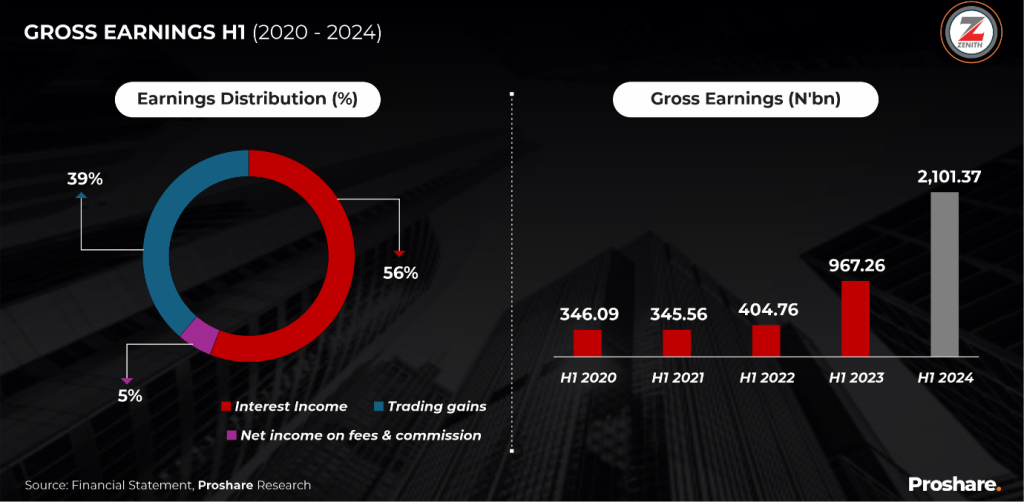
Profitability
Strong top-line earnings cushioned administrative and personnel expenses, allowing significant profit growth. Hence, the group’s pre- and post-tax profit rose by +107.51% and +98.04% to N727.03bn and N578.00bn in H1 2024. Interestingly, the group had a revaluation loss of N219.38bn in H1 2024. This exempts the bank from windfall tax deductions. Analysts observe that a significant portion of the operating costs came from advertisements, licenses, technology, deposit insurance premiums, and AMCON Levy (see chart 2 below).
Chart 2:
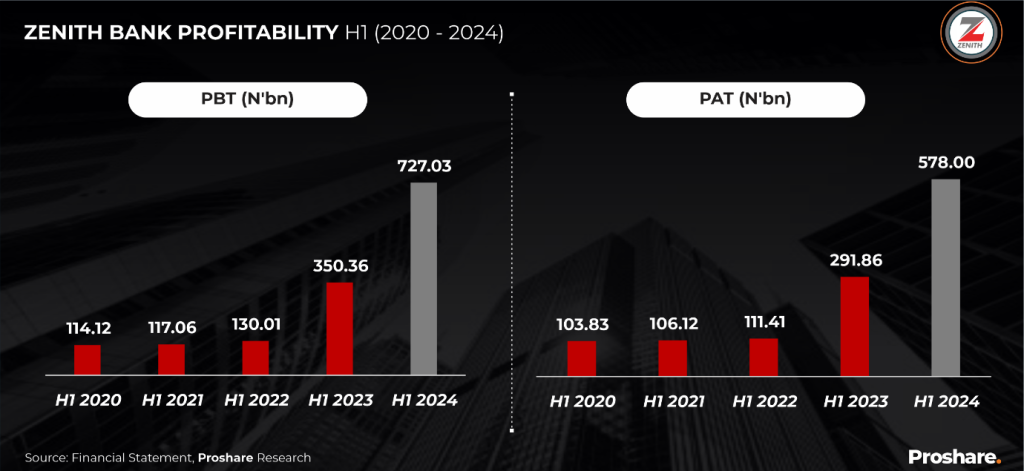
Financial Position
In H1 2024, the group’s total assets increased from N16.03trn in H1 2023 to N27.56trn, driven by cash and bank balance, treasury bills, loans and advances, and investment securities. Similarly, customers’ deposits rose to N19.63trn in H1 2024 from N11.63bn in H1 2023, and higher retained earnings drove shareholders’ equity up (see Table 2 below).
Table 2:
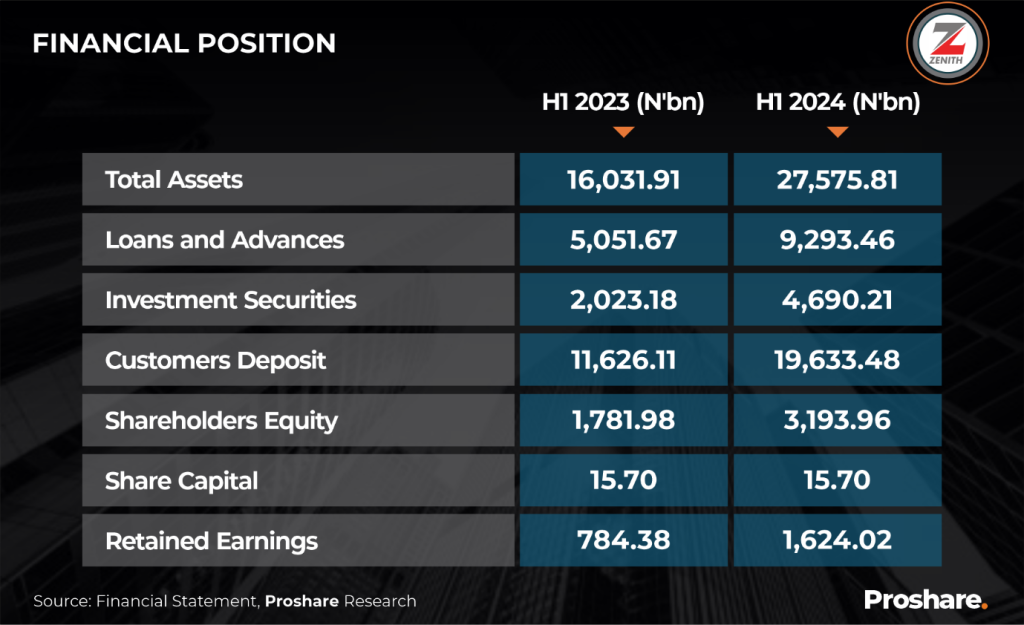
Financial Ratio
The improved earnings translated to positive financial ratios, such as higher ROE, ROA, and net interest margin. However, the default-prone and high-interest rate environment pushed up the non-performing loan ratio (NPLR), cost of risk (CoR), and cost of funds (CoFs) in H1 2024 compared to H1 2023. The higher ratios suggest increased credit exposure and risk (see Table 3 below).
Table 3:
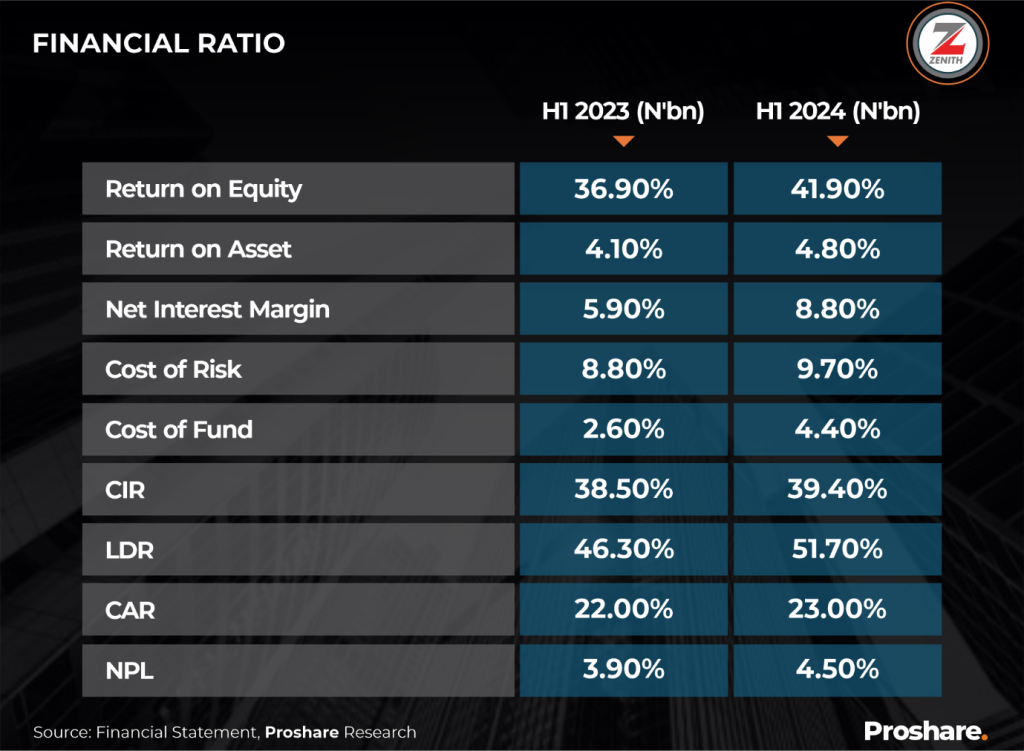
Valuation
The group’s earnings per share (EPS) exceeded market perception, generating a lower price-to-earnings ratio of 1.96x in H1 2024 from 3.96x in H1 2023. Zenith Bank had the lowest P/E among peers, behind FBNH’s P/E of 2.17x and ETI’s P/E of 2.43x. Similarly, the price-to-book value declined to 0.35x in H1 2024 from 0.60x in H1 2023. This might suggest a hidden value potential (see Table 4 below).
Table 4:
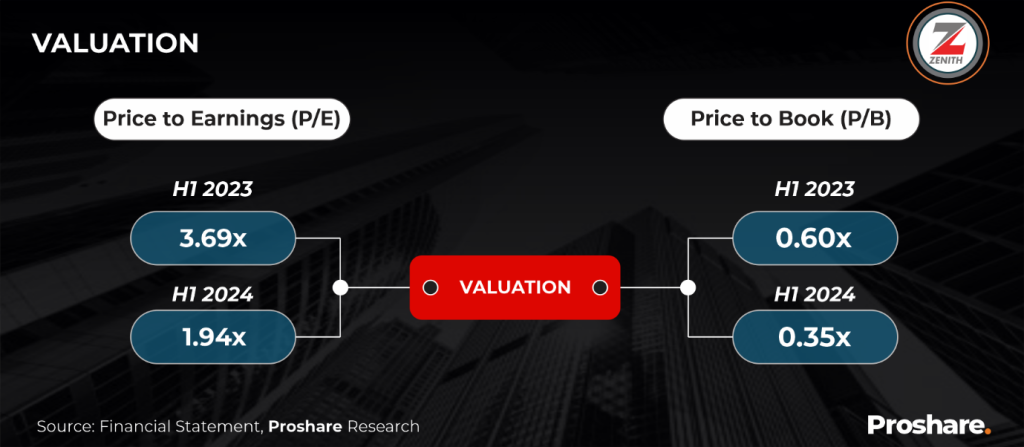
Share Price Movement
The group’s share price took a strong step forward at the beginning of the year, rising from N39.00k to N47.35k on January 09, 2024, but trended downwards. The share price fell to a support level of N32.45k in February and slightly recovered, climbing to N44.55k on April 2, 2024. The bank’s shares lost -2.46% as of September 25, 2024, versus the NGX banking index of +4.90% and the All-share index of +32.38% (see Chart 3 below).
Chart 3:
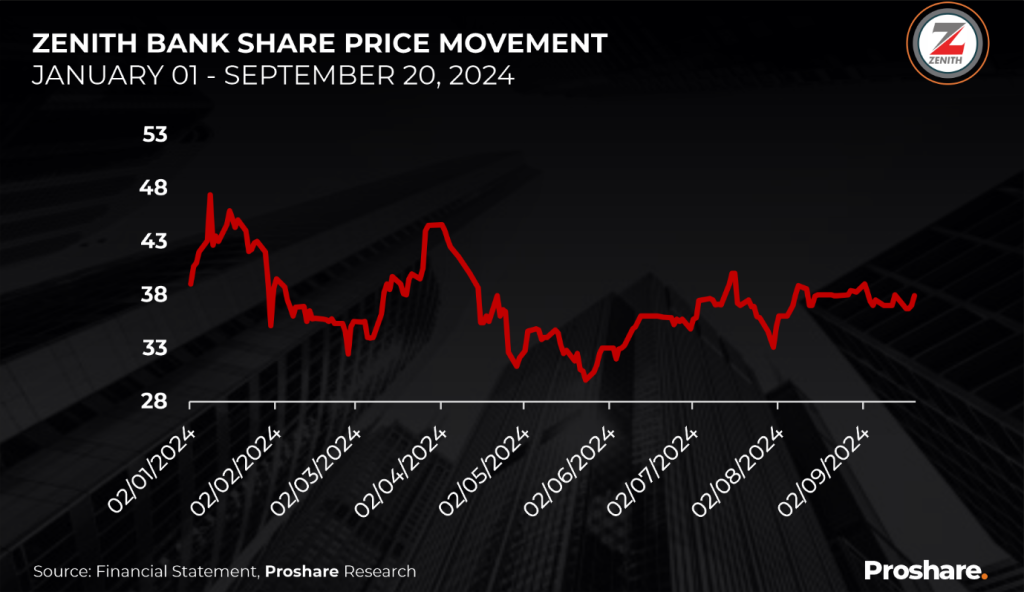
Peer Analysis
The decomposition of Tier 1 banks’ performance in H1 2024 reaffirmed the famous quote that ‘’bigger is not necessarily better’’. The industry’s top 3 banks by assets and earnings saw profit fall behind banks with lower assets and gross earnings, revealing a faculty operational structure. While analysts acknowledge that banks’ commitment to technology integration and elevated energy costs has put significant pressure on operating expenses, diverting away from a brick-and-mortar structure paved the way for banks like GTCO, to hedge the headwinds (GTCO, with around 235 branches relative to other banks with over 500 branches). In absolute numbers, Access Corp had the highest gross earnings at N2.20trn and the lowest PBT at N348.92bn, while GTCO had the lowest gross earnings at N1.39trn but was the only bank to achieve a trillion PBT in H1 2024. This pattern was reflected in financial ratios such as CIR and Net interest margin (NIM), where GTCO and Zenith Bank led, with Access trailing ETI and FBNH.
Zenith Bank had the highest nonperforming loans amongst five tier 1 peers, with an NPL of 4.50%; this was still within the regulator’s statutory requirement of 5%. However, Access Corp had the lowest nonperforming loan amongst six tier 1 banks on
Proshare’s Bank Strength Index (PBSI). Meanwhile, GTCO’s market capitalisation stood at 1.39trn with the lowest P/E ratio of its peers of 1.40x, followed by Zenith Bank with a 1.19trn market cap and a P/E ratio of 1.94x. GTCO’s cost containment strategy reestablishes that banking is quickly migrating beyond buildings and asset size and is concerned with service agility and flexibility; banking is increasingly becoming more about solutions to customers’ journey experiences than their bright and shiny buildings (see illustration 1).
Illustration 1:
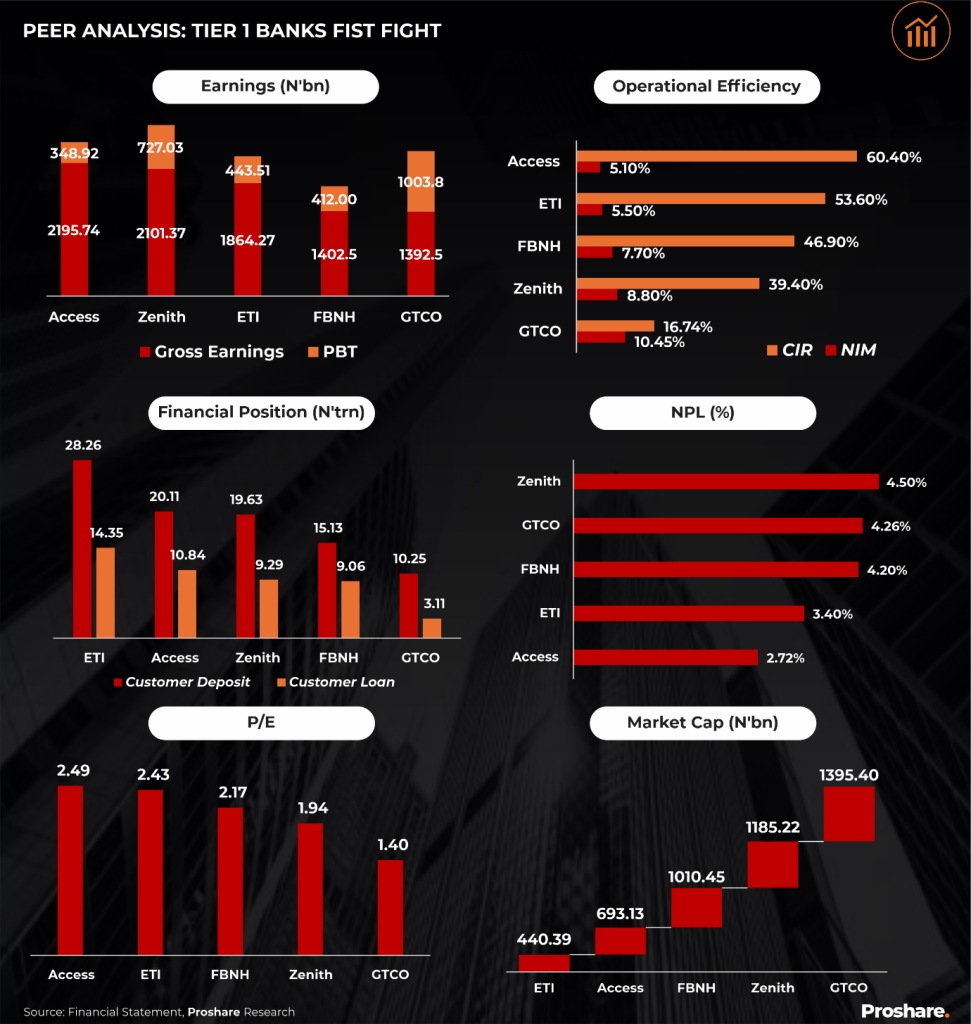
Closing Thoughts
Technology continues to disrupt banking services, and asset size no longer guarantees success and business sustainability. The consequence is that larger banks must be agile to avoid being run out by neo-banks, considering the industry’s vastly lower bank switching cost. Banks like Zenith will need to remodel themselves to improve technology and cater to customers’ service delivery expectations; the recent events that prevented customers from accessing their accounts because of a bank application migration may create the wrong notion about its operations and customer sensitivity. The new age of banking removes commercial power from banks and places it in the hands of customers. The less sensitive a bank is to the consequences of its activities or actions on customers’ journey experiences, the faster the pillars of the bank’s financial stability and sustainability weaken.
Nevertheless, analysts expect Zenith Bank’s strong performance to continue, fuelled by tighter domestic Nigerian monetary policy, larger off-balance sheet derivatives transactions, and stronger credit expansion based on larger tier 1 capital inflows. The bank, however, needs to be cautious about fresh loan assets as its NPL remains higher than its peers, with a significant loan impairment charge of N352.11bn in H1 2024.
Adapted From The Proshare ,Nigeria




